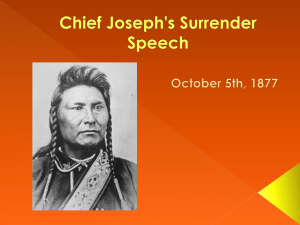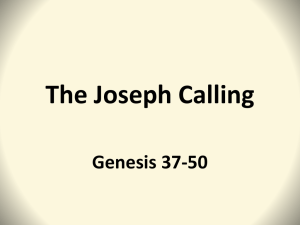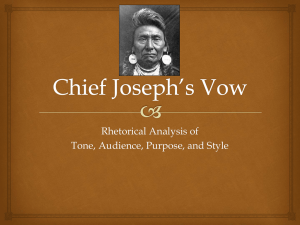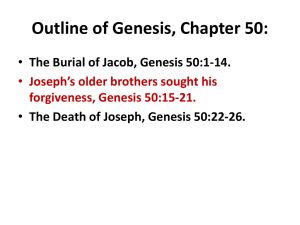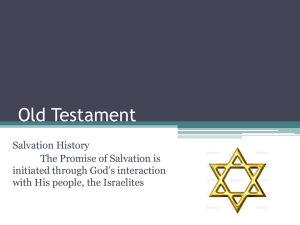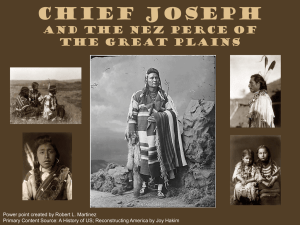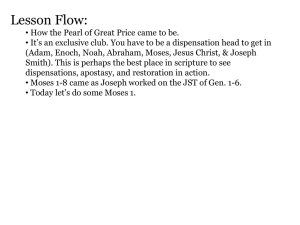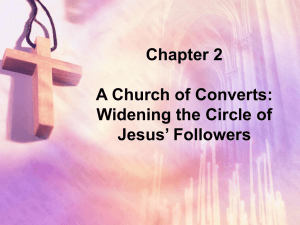October 22, 2014 - Power Point Presentation
advertisement
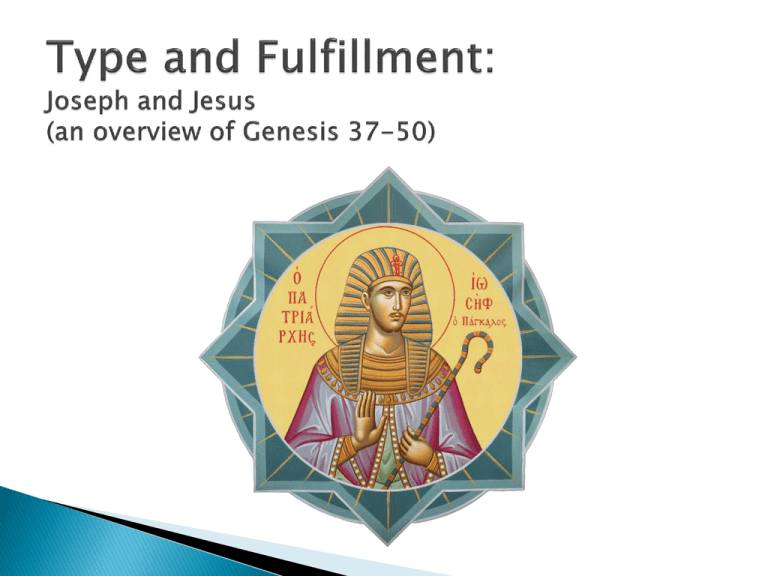
Review of the Joseph story itself ◦ The story stands on its own on the one hand, BUT: Discussion of the significance of the story throughout the rest of the Bible ◦ Specifically as Joseph serves as a “type” of Christ Joseph introduced in Genesis 37 ◦ Dreams his parents/siblings will bow down to him Sold into slavery by his brothers ◦ ◦ ◦ ◦ ◦ Clear violation of the (later) Mosaic Law Sold to the Ishmaelites (cf. Ishmael previously) Idea came from Judah (the predominant tribe) Told Jacob he had been devoured by wild beasts Eventually sold to an Egyptian officer of Pharaoh Joseph rises to prominence in master’s house ◦ Remains faithful to God at all times ◦ Betrayed by master’s wife; imprisoned ◦ Joseph is presented as an anti-Adam Joseph rises to prominence in prison ◦ Became known for his ability to interpret dreams ◦ Interpreted Pharaoh’s dream ◦ Realized there would be famine in all the land Joseph rises to prominence in all Egypt ◦ ◦ ◦ ◦ ◦ Becomes Pharaoh’s “chief of staff” Effectively becomes chief governor of Egypt Appointment occurred when he was 30 years old Married (only one wife, contrary to kings of time) Two sons: Manasseh and Ephraim Famine Joseph foretold actually occurs ◦ People from all over the area come to Egypt for grain, including Joseph’s brothers After a series of events, Joseph becomes known to his brothers ◦ Joseph embraces them and forgives them ◦ Jacob and the brothers relocate to Egypt ◦ Joseph testifies to his faith that it was God’s will for him to be sold into slavery so that he might save the Israelite people Joseph as a central figure in the Bible ◦ Arguably THE central (human) figure in the Old Testament ◦ His bones were placed in the Ark of the Covenant Connects him to the Exodus, which is itself the story shaping the rest of the Bible Connects him to the Torah, God’s teaching Joseph stands outside of—i.e. above—Israel ◦ No tribe bears his name ◦ Similar to Isaac in this respect ◦ Manasseh and Ephraim replace him as ½ tribes Joseph rises to prominence in a foreign land ◦ Emphasis on faithfulness vs. geographic location Similarities in stories of Daniel and Job ◦ Joseph (like Abraham) has no toledot mentioned Stresses we do not obtain the kingdom via birthright Joseph references all glory back to God ◦ When Pharaoh approached him for an answer Gen. 41:16: “It is not in me; God will give Pharaoh an answer of peace.” Israel saved DESPITE their disobedience ◦ Certainly not because of their own faithfulness! All things are under God’s control/providence ◦ Joseph attributes his slavery to God’s omniscience Genesis 45:5-8: “But now, do not therefore be grieved or angry with yourselves because you sold me here; for God sent me before you to preserve life. For these two years the famine has been in the land, and there are still five years in which there will be neither plowing nor harvesting. And God sent me before you to preserve a posterity for you in the earth, and to save your lives by a great deliverance. So now it was not you who sent me here, but God.” Theme continues in Bible, most notably with the destruction of the Temple by God through the Babylonians Genesis 50:19-21: “Joseph said to them, “Do not be afraid, for am I in the place of God? But as for you, you meant evil against me; but God meant it for good, in order to bring it about as it is this day, to save many people alive. Now therefore, do not be afraid; I will provide for you and your little ones.” Joseph as savior ◦ The one sold into slavery redeems Israel, who had been living in freedom ◦ Not only does Joseph save Israel, but also their enemy and the Gentiles, Egypt What is a Type? What is Typology? ◦ Early form of biblical exegesis ◦ Emphasizes the predictive relationship of the Old and New Testaments ◦ Type (in OT) predicts Antitype (in NT) ◦ Leads to a deeper appreciation for the interconnectedness of the entire Bible ◦ Is, perhaps, easiest to see “in the rearview mirror” What are some of the ways in which Joseph functions as a “type” of Christ? Sold into slavery ◦ Joseph betrayed by his brothers Jesus betrayed by His disciples, to whom He referred as brothers; they all forsook Him and fled ◦ Joseph sold for 20 pieces of silver Jesus sold for 30 pieces of silver ◦ Judah was the “master planner” to sell Joseph Judas, which is the exact same name in Greek as Judah, is the one who betrayed Jesus Luke 6:16 refers to Judas as the “son of James,” which in Greek is actually the same as Jacob (Iakavos) Judah in Genesis is, of course, also the son of Jacob Trust in God ◦ Joseph accepts his fate as God’s will; tells his brothers it is not his place to judge them Jesus accepts His fate as God’s will; refuses to call upon the angels to save Him; asks God to forgive His betrayers/crucifiers, “for they know not what they do” ◦ Joseph does not give in to the temptation of his master’s wife, even when threatened Jesus refuses to give in to Satan’s temptations ◦ Joseph references all glory/miracles back to God the Father Jesus explicitly teaches “My Father is greater than I” (John 14:28) Accepted by the “outsiders,” the Gentiles ◦ Joseph becomes the ruler of Egypt Jesus becomes the Lord/ruler of the Gentiles ◦ Joseph is seated at “the right hand” of Pharaoh Jesus is seated at “the right hand” of God ◦ Joseph physically saves both his own people AND the Gentiles from the famine Jesus spiritually saves both His own people and the Gentiles ◦ Joseph begins his public service at the age of 30 Jesus begins His public ministry a ◦ Joseph marries an Egyptian, thus bringing her into the Abrahamic lineage/covenant Christ “marries” the Church, which includes Gentiles who are brought into God’s covenant community thru the promise made to Abraham Begins with Abraham (not Adam) ◦ To him was made God’s promise Continues through Isaac, Jacob, and then Judah ◦ We know the story/troubles of Judah Through Zerubabel, all biblical names ◦ Remaining names are from an unknown source(s) After Matthan (gift/grace of God), the lineage returns to Jacob Instead of continuing through Judah, we have a continuation through Joseph to Jesus ◦ The way to God is through the path of Joseph/Jesus, not the road of Judah Importance is not to live in the “Promised Land” itself, but to be obedient to God wherever you find yourself ◦ Joseph serves as a model for putting trust in God ◦ Those who trust in God will ultimately be redeemed by God in God’s time Joseph as a central figure in the Bible ◦ Ark of the Covenant ◦ Connection with Torah/Exodus Joseph as a “type” of Christ ◦ Through being betrayed becomes the savior of all We read Joseph’s story during 6th week of Great Lent
